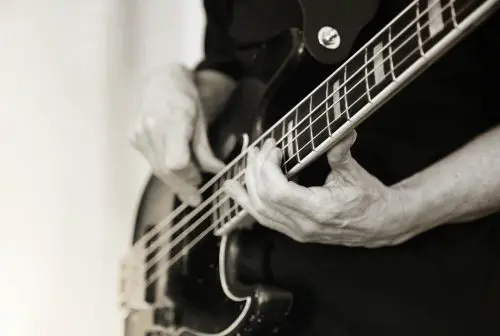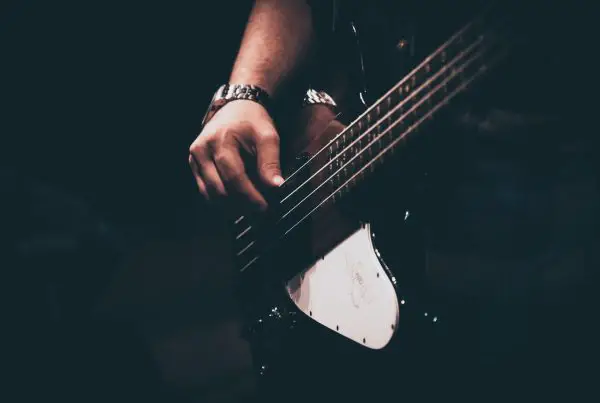The best action for the bass is the one that feels and sounds the best for a player and what he/she is playing. Though, a high action can be bad when it comes to playability, more pain in fingers, and even tuning stability.
So, the action is a matter of preference, and players need to experiment until the desired feel is achieved.
I was talking to a bassist working in a music shop, and he said he knows how to adjust the action at home so he can make the bass perfect for any song. For example, he said he loves to lower the action a bit while playing metal and fast riffs.
Some common action measurements on a bass guitar are around 5/64″ up to about 7/64″, and my opinion is that you have to find a balance – adjust the action to the genre, but don’t go extreme, so the action starts to affect the playability, or cause so much of a fret buzz.
This article will help you to improve yourself as a player and to find out how to check and adjust the action to feel and sound way better. The article includes:
- How High Should The Action Be On A Bass?
- Is The Action Too High On My Bass?
- Is High Action Bad On Bass?
- Should A Bass Have High Action?
- How Do I Know If My Bass Action Is Too High?
- How Do You Set The Action On A Bass?
- Does Bass Action Affect Tone?
- Conclusion
How High Should The Action Be On A Bass?
A common action measurement on a bass guitar is between 5/64″ (2mm) and 7/64″ (2.8 mm). Some players feel better with the lower action, and some love high action more.
The bass action that gives you the sound and the feel you want out of your instrument is the right one and should be just like that.
The bass action is not an objective thing – it’s a matter of preference, and therefore, there is no rule! Everyone has to choose what’s best for them.
So, as long as you’re happy and satisfied with the sound and playability of the bass, don’t change the action.
It’s just about finding a balance. Remember that the action is still not a proper one if it’s good for a genre sound or speed but has a bad impact on the playability.
The action choice is based on some factors, and they really need to be considered in a moment of finding out the best action for you. They are playing style, genre, and level of playing.
Playing Style And Genre
Players often choose a perfect bass action due to the genre and playing style. These two factors are different from player to player, and that’s why the term ‘the best bass action’ can’t be generalized.
Some players prefer an aggressive style, while others love to play softer. Some of them love metal, while others prefer bluegrass, and different actions mean different feel and sound to them.
My friend loves a higher action for traditional genres – she said the sound is just the way she wanted it to be. On the other side, she always chooses a lower action for playing fast bass riffs.
Level Of Playing
A level of playing is another factor that needs to be considered while choosing the best bass action.
If the action is high, an entry-level bassist will feel more pain in the hands and fingers. That player hasn’t developed muscle strength and calluses yet, so he/she will be struggling with pressing the string down and therefore producing that ‘beginner buzz’.
These things can be demotivating for beginners and maybe can affect their commitments.
Therefore, I recommend you to choose a lower action if you’re a beginner because it will be much easier for you to play and learn bass fundamentals.
You can find more information about this here – High Vs Low Action String: Which Is Easier To Play & Strum

Low action is easier to play and more suitable for fast playing.
Is The Action Too High On My Bass?
The action is too high on your bass if it’s hard for you to play and press the strings down, if it’s harder for you to perform your preferred technique, or if you can’t perform faster movements.
If you hardly press the string down and see the bass is really hard for you to play, then the bass action is too high, and you should lower it.
If you’re a beginner and you can’t play because your hand’s and fingers’ pain is just getting worse – lower the strings’ action because the current one is too high for your not-so-strong, beginner hand.
If you prefer a softer playing style, the action is too high if you can’t play in a way you want, and you need to do it more aggressively.
Also, if the song includes a fast bass riff, the bass action is too high if you can’t follow the metronome because the higher action means slower movements.
So, if you prefer one action measurement, it doesn’t mean your choice is perfect for everybody. Everyone determines for themselves whether the action is too high or not.
I recommend you listen to your feelings, and according to them, find the best action for your playing style, level of playing, or a specific-genre song.
As I said, there are some common action measurements, and many bassists will say the action seems weird if it’s not in a common range. But, it’s still a personal thing.
Is High Action Bad On Bass?
High action on the bass is bad if the playability is affected or if the player just doesn’t feel good about having a high action – the bass doesn’t support a preferred technique or particular-genre elements.
Beginners can get some hand, neck, back, or shoulder injuries if they play on a bass with a higher action. They haven’t got the required muscle strength, so they struggle and barely press the strings down.
High action can be considered as bad if it doesn’t give you a wanted sound or doesn’t support your technique. For example, if you want to work on tapping, a high action is going to make that much harder.
You can’t say a particular action is better than another one in general. As I said, everything is up to the bassist and his/her preferences.
So, if the bass with a high action is working against you and your wishes, that specific action is a bad thing for you and your playing. Specific action can be bad just for you, not for everyone.

Don’t use high action on bass if you feel uncomfortable. Focus on getting the techniques right first. Worry about actions later.
Should A Bass Have High Action?
Use high action on a bass If the player has already developed calluses and muscle strength, plays the song with slower riffs, needs a minimal fret buzz, and prefers a more aggressive playing style.
Otherwise, use lower action on a bass if the bassist is an entry-level player and hasn’t developed calluses and muscle strength yet, has a light touch and prefers a softer playing style, or plays a song that requires faster movements, then no.
Therefore, a bass shouldn’t necessarily have high action unless it satisfies the player – an adequate action is determined due to players’ preferences.
Does Bass Action Affect Tone?
Bass action can’t affect the tone directly, but it is done indirectly – by playing on a too-high-action-for-me bass or by lowering the action too much.
Playing on bass with high action, which is actually too high for you, can affect the overall sound – you won’t be able to press the strings down properly, and you’ll hear the buzz.
If you are a beginner, your ‘tolerance’ is a bit lower, and you’ll struggle with pressing strings on a specific height, while other, more experienced bassists won’t have that problem because their tolerance is higher as they’ve developed muscle strength.
On the other hand, lowering the action too much doesn’t allow the strings to vibrate freely as they keep on hitting frets, so you’ll hear some fret buzzing.
You can avoid this by raising the action just a little bit to make more room for strings to vibrate.
How Do You Set The Action On A Bass?
After adjusting the truss rod, measure the 12th-fret lower E string action with a graduated ruler, and raise or lower the action by making some adjustments on the saddle and nut.
Once you measure, choose whether it is suitable for you to raise or lower the action. The choice is based on your personal preferences.
For example, if you want your instrument to be easier to play, then lower the action. If you can’t stand the fret buzz while playing, raise the action.
Choose something in between – not so high for you, and not so low and with buzzing.
You can find more information about setting up the bass action here – High Vs Low Action String: Which Is Easier To Play & Strum. It includes a video and everything you need to know.
Conclusion
The best action for the bass is not an objective thing – it’s about the players’ preferences.
If a current action doesn’t express what you actually want and need, that doesn’t mean it won’t express someone else’s needs and desires.
Listen to your feelings and choose the proper action to make your instrument work for you.





